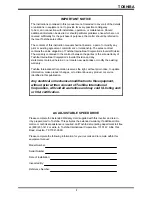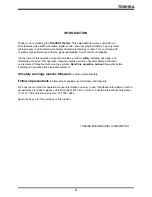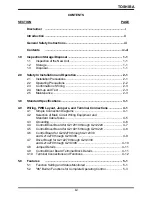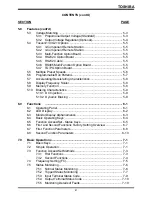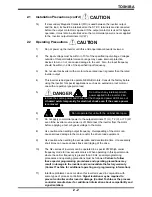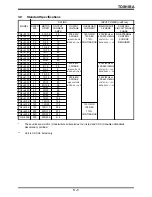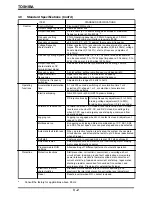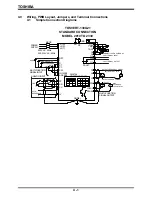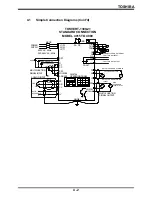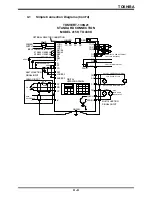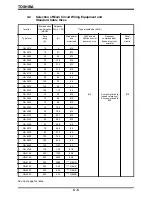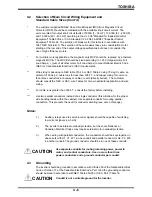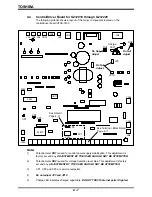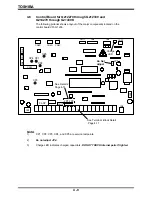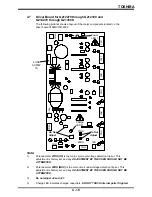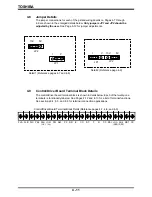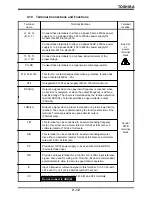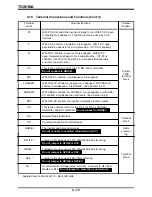
TOSHIBA
3.0
Standard Specifications (Cont'd)
Control
Control Method
Sinusoidal PWM control
Output voltage regulation
Same as power line.
Output frequency
0.5 to 400Hz (0.1 to 80Hz setting when shipped); maximum
frequency range is 30 to 400Hz
*
Frequency setting
0.1Hz: Operating panel input; 0.03Hz: Analog input; 0.01Hz:
resolution
Input through computer interface (against a 60Hz)
Frequency accuracy
±0.5% (at 25°C; ±10°C) against the maximum frequency
Voltage/frequency
Either constant V/f or second-order nonlinear mode for variable
characteristics
torque. "Max voltage" frequency adjustment (25 to 400Hz), voltage
boost adjustment (0 to 30%), start-up frequency adjustment
(0 to 10Hz)
Frequency setting signals
3k ohms potentiometer (a 1k to 10k ohms-rated potentiometer
can be connected). 0 to 10Vdc (input impedance: 30k ohms), 0 to
5Vdc (15k ohms), 4 to 20mAdc (250 ohms)
Output frequency
Can be set to an arbitrary characteristic by setting 2 points.
characteristics of IV
terminal input signal
Frequency jump
3-point setting; setting jump frequency and band width
Upper/lower limit
Upper limit frequency: 0 to maximum frequency
frequencies
Lower limit frequency: 0 to upper limit frequency
PWM carrier frequency
Adjusted in the range of 0.5kHz to 3kHz
switching
Operating
Acceleration/deceleration
0.1 to 6000 seconds, switching of acceleration time 1 or 2,
functions
time
selection of S-shaped 1 or 2, or selection of acceleration/
deceleration patterns
Electrical braking
G2+2010 to G2+430K; IGBT7 dynamic braking
DC injection braking Start-up frequency adjustment (0 to 10Hz),
braking voltage adjustment (0 to 20%),
braking time adjustment (0 to 5 seconds)
Forward or reverse run
Forward run when F-CC closed; reverse run when R-CC closed;
reverse run when both F-CC and R-CC closed; coasting stop
when ST-CC open; emergency coast stop by a command from
operating panel
Jogging run
Jogging run engaged when N.O. contact is closed. (adjustment
range 0 to 20Hz)
Multispeed run
By opening and closing different combinations of CC, SS1, SS2,
and SS3, the set speed or seven preset speeds can be selected.
Automatic fault latch reset
When a protective function is activated, the system checks main
circuit devices, and attempts the restart up to 5 times (deactivated
when shipped)
Soft stall
Sustains a run in overload mode (set at OFF when shipped)
Automatic restart
Smoothly recovers a normal run of a free-running motor utilizing
motor speed detection control.
Programmable RUN
Allows setting of 7 different patterns of automatic operation
patterns
Protection
Protective functions
Stall prevention, current limit, overcurrent, overvoltage, short-
circuit at load, load-end ground fault, undervoltage, momentary
power interrupt, electronic thermal overload, main circuit over-
current at start-up, load-end overcurrent at start-up, regenerative
discharge resistor overcurrent or overload, fin overheat, and
emergency stop. Provisions for external fault signal.
Electronic thermal
Standard motor/constant torque V/f motor switching, and
characteristics
electronic thermal stall prevention activating level adjustment
Reset
Resets inverter when N.O. contact is closed.
3 - 2
ITEM
STANDARD SPECIFICATIONS
*
Consult the factory for applications above 80 Hz.
Summary of Contents for TOSVERT-130G2+
Page 112: ...TOSHIBA 10 6 Schematics 10 17 ...


